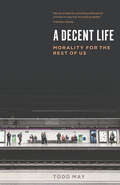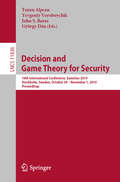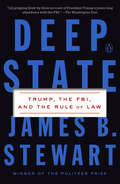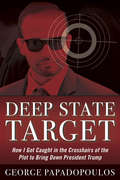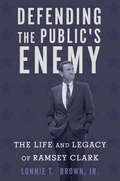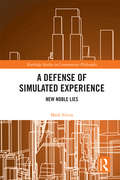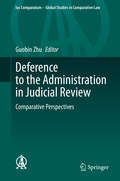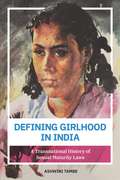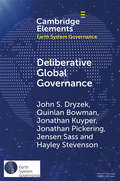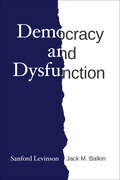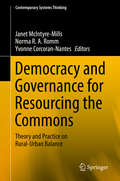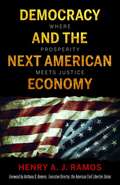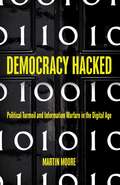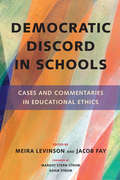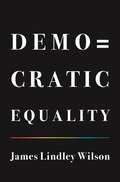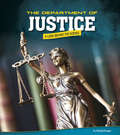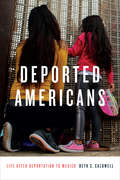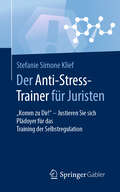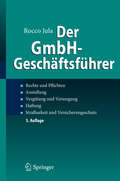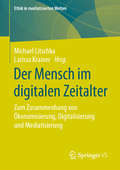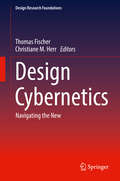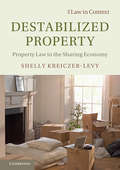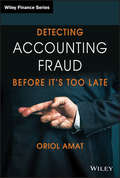- Table View
- List View
A Decent Life: Morality for the Rest of Us
by Todd May“In lively prose, May . . . breaks down complex philosophical concepts and uses a range of everyday examples to illustrate how morality can be practical.” —Publishers WeeklyIn a world full of suffering and deprivation, it’s easy to despair—and it’s also easy to judge ourselves for not doing more. Even if we gave away everything we own and devoted ourselves to good works, it wouldn’t solve all the world’s problems. It would make them better, though. So is that what we have to do? Is anything less a moral failure? Can we lead a fundamentally decent life without taking such drastic steps?Todd May has answers. He’s not the sort of philosopher who tells us we have to be model citizens who display perfect ethics in every decision we make. He’s realistic: he understands that living up to ideals is a constant struggle. In A Decent Life, May leads readers through the traditional philosophical bases of a number of arguments about what ethics asks of us, then he develops a more reasonable and achievable way of thinking about them, one that shows us how we can use philosophical insights to participate in the complicated world around us. He explores how we should approach the many relationships in our lives—with friends, family, animals, people in need—through the use of a more forgiving, if no less fundamentally serious, moral compass. With humor, insight, and a lively and accessible style, May opens a discussion about how we can, realistically, lead the good life that we aspire to.“A meditation on how striving for decency is a route towards personal satisfaction and happiness.” —Chicago Tribune
Decision and Game Theory for Security: 10th International Conference, GameSec 2019, Stockholm, Sweden, October 30 – November 1, 2019, Proceedings (Lecture Notes in Computer Science #11836)
by Tansu Alpcan Yevgeniy Vorobeychik John S. Baras György DánThis book constitutes the refereed proceedings of the 10th International Conference on Decision and Game Theory for Security, GameSec 2019,held in Stockholm, Sweden, in October 2019.The 21 full papers presented together with 11 short papers were carefully reviewed and selected from 47 submissions.The papers focus on protection of heterogeneous, large-scale and dynamic cyber-physical systems as well as managing security risks faced by critical infrastructures through rigorous and practically-relevant analytical methods.
Deduct It!: Lower Your Small Business Taxes
by Stephen FishmanReduce your taxes Deduct It! shows you how to maximize your business deductions—quickly, easily, and legally. Whether your business is just starting or well established, this book is indispensable to your financial success. It covers deductions for: start-up and operating expenses travel and meals home offices medical expenses equipment and inventory and more. Learn about the new tax law and how it affects small business owners, including the new 20% pass-through deduction and changes to entertainment and other business deductions and credits. Easy to read and full of real-world examples, Deduct It! will pay for itself many times over. This edition is completely updated to cover the new Tax Cuts and Jobs Act.
Deep State: Trump, the FBI, and the Rule of Law
by James StewartFrom bestselling author James Stewart, the definitive story of the war between President Trump and America's principal law enforcement agencies, answering the questions that the Mueller report couldn't – or wouldn't <P><P>When Trump fired James Comey, he triggered the appointment of Robert Mueller as an independent special counsel and caused the FBI to open a formal investigation into the President himself. This set in motion a chain of events, which would join in unprecedented and potentially mortal combat two vital institutions of American democracy: the Presidency and the Federal Bureau of Investigation, the investigative arm of the Department of Justice. <P><P>The stakes could not be higher: the rule of law itself, the foundation of the American constitution and Anglo-American democracy for centuries. In this epic battle, there is no room for compromise. There can only be winners and losers, to invoke a distinctly Trumpian view of the world. But there is plenty of room for collateral damage. The reputations of both sides have already been harmed, perhaps irrevocably, and at great cost to American democracy and its institutions. <P><P>Drawing on scores of interviews with key FBI, Justice Department, and White House officials, and voluminous transcripts, notes, and internal reports, Stewart tells the dramatic saga of the FBI and its simultaneous investigations of both Hillary Clinton and Donald Trump – the first time in American history the FBI has been thrust into the middle of both parties' campaigns for the Presidency. Packed with drama and a cast of fascinating characters, Deep State goes where others cannot, revealing the truth of the grand and world-changing struggle that has defined the Trump presidency. <P><P><b>A New York Times Bestseller</b>
Deep State Target: How I Got Caught in the Crosshairs of the Plot to Bring Down President Trump
by George PapadopoulosThe former advisor to President Trump shares an insider account of the investigation into Russian collusion in a memoir that &“unfolds like a spy thriller&” (Publishers Weekly). As a young, ambitious foreign policy advisor to Donald Trump&’s presidential campaign, George Papadopoulos became the first Trump official to plead guilty in special Counsel Robert Mueller&’s investigation into Russian interference in the 2016 election. He then became the first campaign advisor sentenced to prison. But as he explains in Deep State Target, there was an intricate set up at play, and it was neither Trump nor the Russians pulling the strings. American and allied intelligence services set out to destroy a Trump presidency before it even started. Here, Papadopoulos gives the play-by-play of how operatives like Professor Joseph Mifsud, Sergei Millian, Alexander Downer, and Stefan Halper worked to invent a Russian conspiracy that would irreparably damage the Trump administration. Papadopoulos was there: In secret meetings across the globe, on city streets being tailed by agents, and ultimately being interrogated by Mueller&’s team and agreeing to a guilty plea.
Defending the Public's Enemy: The Life and Legacy of Ramsey Clark
by Lonnie T. BrownWhat led a former United States Attorney General to become one of the world's most notorious defenders of the despised? Defending the Public's Enemy examines Clark's enigmatic life and career in a quest to answer this perplexing question. The culmination of ten years of research and interviews, Lonnie T. Brown, Jr. explores how Clark evolved from our government's chief lawyer to a strident advocate for some of America's most vilified enemies. Clark's early career was enmeshed with seminally important people and events of the 1960s: Martin Luther King, Jr., Watts Riots, Selma-to-Montgomery March, Black Panthers, Vietnam. As a government insider, he worked to secure the civil rights of black Americans, resisting persistent, racist calls for more law and order. However, upon entering the private sector, Clark seemingly changed, morphing into the government's adversary by aligning with a mystifying array of demonized clients—among them, alleged terrorists, reputed Nazi war criminals, and brutal dictators, including Saddam Hussein. Is Clark a man of character and integrity, committed to ensuring his government's adherence to the ideals of justice and fairness, or is he a professional antagonist, anti-American and reflexively contrarian to the core? The provocative life chronicled in Defending the Public's Enemy is emblematic of the contradictions at the heart of American political history, and society's ambivalent relationship with dissenters and outliers, as well as those who defend them.
A Defense of Simulated Experience: New Noble Lies (Routledge Studies in Contemporary Philosophy)
by Mark SilcoxThis book defends an account of the positive psychological, ethical, and political value of simulated human experience. Philosophers from Plato and Augustine to Heidegger, Nozick, and Baudrillard have warned us of the dangers of living on too heavy a diet of illusion and make-believe. But contemporary cultural life provides broader, more attractive opportunities to do so than have existed at any other point in history. The gentle forms of self-deceit that such experiences require of us, and that so many have regarded as ethically unwholesome or psychologically self-destructive, can in fact serve as vital means to political reconciliation, cultural enrichment, and even (a kind of) utopia. The first half of the book provides a highly schematic definition of simulated experience and compares it with some claims about the nature of simulation made by other philosophers about what it is for one thing to be a simulation of another. The author then provides a critical survey of the views of some major authors about the value of certain specific types of simulated experience, mainly in order to point out the many puzzling inconsistencies and ambiguities that their thoughts upon the topic often exhibit. In the second half of the book, the author defends an account of the positive social value of simulated experience and compares his own position to the ideas of a number of utopian political thinkers, as well as to Plato's famous doctrine of the "noble lie." He then makes some tentative practical suggestions about how a proper appreciation of the value of simulated experience might influence public policy decisions about such matters as the justification of taxation, paternalistic "choice management," and governmental transparency. A Defense of Simulated Experience will appeal to a broad range of philosophers working in normative ethics, aesthetics, the philosophy of technology, political philosophy, and the philosophy of culture who are interested in questions about simulated experience. The book also makes a contribution to the emerging field of Game Studies.
Deference to the Administration in Judicial Review: Comparative Perspectives (Ius Comparatum - Global Studies in Comparative Law #39)
by Guobin ZhuThis book investigates judicial deference to the administration in judicial review, a concept and legal practice that can be found to a greater or lesser degree in every constitutional system. In each system, deference functions differently, because the positioning of the judiciary with regard to the separation of powers, the role of the courts as a mechanism of checks and balances, and the scope of judicial review differ. In addition, the way deference works within the constitutional system itself is complex, multi-faceted and often covert. Although judicial deference to the administration is a topical theme in comparative administrative law, a general examination of national systems is still lacking. As such, a theoretical and empirical review is called for. Accordingly, this book presents national reports from 15 jurisdictions, ranging from Argentina, Canada and the US, to the EU. Constituting the outcome of the 20th General Congress of the International Academy of Comparative Law, held in Fukuoka, Japan in July 2018, it offers a valuable and unique resource for the study of comparative administrative law.
Defining Girlhood in India: A Transnational History of Sexual Maturity Laws
by Ashwini TambeAt what age do girls gain the maturity to make sexual choices? This question provokes especially vexed debates in India, where early marriage is a widespread practice. India has served as a focal problem site in NGO campaigns and intergovernmental conferences setting age standards for sexual maturity. Over the last century, the country shifted the legal age of marriage from twelve, among the lowest in the world, to eighteen, at the high end of the global spectrum. Ashwini Tambe illuminates the ideas that shaped such shifts: how the concept of adolescence as a sheltered phase led to delaying both marriage and legal adulthood; how the imperative of population control influenced laws on marriage age; and how imperial moral hierarchies between nations provoked defensive postures within India. Tambe takes a transnational feminist approach to legal history, showing how intergovernmental debates influenced Indian laws and how expert discourses in India changed UN terminology about girls. Ultimately, Tambe argues, the well-meaning focus on child marriage has been tethered less to the interests of girls themselves and more to parents’ interests, achieving population control targets, and preserving national reputation.
Deliberative Global Governance (Elements in Earth System Governance)
by John S. Dryzek Quinlan Bowman Jonathan Kuyper Jonathan Pickering Jensen Sass Hayley StevensonGlobal institutions are afflicted by severe democratic deficits, while many of the major problems facing the world remain intractable. Against this backdrop, we develop a deliberative approach that puts effective, inclusive, and transformative communication at the heart of global governance. Multilateral negotiations, international organizations and regimes, governance networks, and scientific assessments can be rendered more deliberative and democratic. More thoroughgoing transformations could involve citizens' assemblies, nested forums, transnational mini-publics, crowdsourcing, and a global dissent channel. The deliberative role of global civil society is vital. We show how different institutional and civil society elements can be linked to good effect in a global deliberative system. The capacity of deliberative institutions to revise their own structures and processes means that deliberative global governance is not just a framework but also a reconstructive learning process. A deliberative approach can advance democratic legitimacy and yield progress on global problems such as climate change, violent conflict and poverty.
Democracy and Dysfunction
by Sanford Levinson Jack M. BalkinIt is no longer controversial that the American political system has become deeply dysfunctional. Today, only slightly more than a quarter of Americans believe the country is heading in the right direction, while sixty-three percent believe we are on a downward slope. The top twenty words used to describe the past year include “chaotic,” “turbulent,” and “disastrous.” Donald Trump’s improbable rise to power and his 2016 Electoral College victory placed America’s political dysfunction in an especially troubling light, but given the extreme polarization of contemporary politics, the outlook would have been grim even if Hillary Clinton had won. The greatest upset in American presidential history is only a symptom of deeper problems of political culture and constitutional design. Democracy and Dysfunction brings together two of the leading constitutional law scholars of our time, Sanford Levinson and Jack M. Balkin, in an urgently needed conversation that seeks to uncover the underlying causes of our current crisis and their meaning for American democracy. In a series of letters exchanged over a period of two years, Levinson and Balkin travel—along with the rest of the country—through the convulsions of the 2016 election and Trump’s first year in office. They disagree about the scope of the crisis and the remedy required. Levinson believes that our Constitution is fundamentally defective and argues for a new constitutional convention, while Balkin, who believes we are suffering from constitutional rot, argues that there are less radical solutions. As it becomes dangerously clear that Americans—and the world—will be living with the consequences of this pivotal period for many years to come, it is imperative that we understand how we got here—and how we might forestall the next demagogue who will seek to beguile the American public.
Democracy and Governance for Resourcing the Commons: Theory and Practice on Rural-Urban Balance (Contemporary Systems Thinking)
by Yvonne Corcoran-Nantes Norma R. A. Romm Janet McIntyre-MillsThis book promotes the well-being of the commons through representation and accountability through monitoring from below in order to operationalize engagement. This book views the commons as a legal concept, a transformative governance concept, and a basis for systemic ethics. The chapters focus on practical responses to address complex problems that comprise many interrelated variables and are perceived differently by stakeholders with different values and life experiences. By considering these different stakeholders, the goal is to highlight ways to regenerate and invigorate employment opportunities. The book identifies pathways towards ethical vocational education to enable lifelong engagement by active citizens which requires action learning to address areas of perceived policy concern. Throughout the chapters in this book, the authors discuss transformative research and its implications on stakeholders. They focus on re-presentation and its implications for thinking and practice. One author makes the case for fostering non anthropocentric approaches to ethical development. In addition, the chapters cover case studies including governance challenges associated with water management using a mixed method approach and also production of mushrooms in collaboration with coffee growers in Jakarta. The book focuses on ways to de-colonialise knowledge formation in public policy and makes the case for an alternative approach to governance and democracy that takes into account a range of local people’s perspectives.
Democracy And The Next American Economy: Where Prosperity Meets Justice
by Henry A. J. RamosProgressive intellectual Henry A. J. Ramos believes the United States is at a crossroads, facing the most challenging moment since the civil rights movement of the late 1960s and early 1970s. In fact, absent major new interventions and investments, he sees this moment as a pivotal turning point in the American journey in which political polarization, income and wealth disparity and public violence"€"much of which is race related"€"threaten the very essence and integrity of our democracy and economy. Ramos examines the policies that have contributed to America's decline, including those that have led to the concentration of great wealth in the hands of a few while condemning many to systemic poverty and inequality. Current economic and social trends, he stresses, are unsustainable and call for organized, concerted action by people of conscience and those affected. <P><P> Ultimately, Ramos provides a roadmap for the future so the United States can continue to provide opportunities for its people and serve again as a leader in the international community. He offers case studies of organizations that have successfully created and administered programs that further equity in society, restore democratic practices, implement better urban and city planning and protect the environment. <P><P> Demonstrating both the critical importance and real possibility of leveraging prosperity and justice for all Americans, this compelling work is a must-read for anyone interested in democracy, economic restoration and environmental sustainability.
Democracy Hacked: How Technology is Destabilising Global Politics
by Martin MooreTechnology has fractured democracy, and now there&’s no going back. All around the world, the fringes have stormed the palace of the elites and unleashed data miners, dark ads and bots on an unwitting public. After years of soundbites about connecting people, the social media giants are only just beginning to admit to the scale of the problem. We stand on the precipice of an era where switching your mobile platform will have more impact on your life than switching your government. Where freedom and privacy are seen as incompatible with social well-being and transparency. Where your attention is sold to the highest bidder. Our laws don&’t cover what is happening and our politicians don&’t understand it. But if we don&’t fight to change the system now, we may not get another chance.
Democratic Discord in Schools: Cases and Commentaries in Educational Ethics
by Meira Levinson and Jacob FayTeaching in a democracy is challenging and filled with dilemmas that have no easy answers. For example, how do educators meet their responsibilities of teaching civic norms and dispositions while remaining nonpartisan? Democratic Discord in Schools features eight normative cases of complex dilemmas drawn from real events designed to help educators practice the type of collaborative problem solving and civil discourse needed to meet these challenges of democratic education. Each of the cases also features a set of six commentaries written by a diverse array of scholars, educators, policy makers, students, and activists with a range of political views to spark reflection and conversation. Drawing on research and methods developed in the Justice in Schools project at the Harvard Graduate School of Education (HGSE), Democratic Discord in Schools provides the tools that allow educators and others to practice the deliberative skills they need in order to find reasonable solutions to common ethical dilemmas in politically fraught times.
Democratic Equality
by James Lindley WilsonDemocracy establishes relationships of political equality, ones in which citizens equally share authority over what they do together and respect one another as equals. But in today's divided public square, democracy is challenged by political thinkers who disagree about how democratic institutions should be organized, and by antidemocratic politicians who exploit uncertainties about what democracy requires and why it matters. Democratic Equality mounts a bold and persuasive defense of democracy as a way of making collective decisions, showing how equality of authority is essential to relating equally as citizens.James Lindley Wilson explains why the US Senate and Electoral College are urgently in need of reform, why proportional representation is not a universal requirement of democracy, how to identify racial vote dilution and gerrymandering in electoral districting, how to respond to threats to democracy posed by wealth inequality, and how judicial review could be more compatible with the democratic ideal. What emerges is an emphatic call to action to reinvigorate our ailing democracies, and a road map for widespread institutional reform.Democratic Equality highlights the importance of diverse forms of authority in democratic deliberation and electoral and representative processes—and demonstrates how that authority rests equally with each citizen in a democracy.
The Department of Justice: A Look Behind the Scenes (U.S. Government Behind the Scenes)
by Michael BurganDescribes the history of the Department of Justice, and how it has evolved, what the pressing issues are today, and what lies ahead in the near future. Takes a potentially dry topic and makes it accessible for the younger reader. Sidebars highlight important issues and figures in history.
Deported Americans: Life after Deportation to Mexico
by Beth C. CaldwellWhen Gina was deported to Tijuana, Mexico, in 2011, she left behind her parents, siblings, and children, all of whom are U.S. citizens. Despite having once had a green card, Gina was removed from the only country she had ever known. In Deported Americans legal scholar and former public defender Beth C. Caldwell tells Gina's story alongside those of dozens of other Dreamers, who are among the hundreds of thousands who have been deported to Mexico in recent years. Many of them had lawful status, held green cards, or served in the U.S. military. Now, they have been banished, many with no hope of lawfully returning. Having interviewed over one hundred deportees and their families, Caldwell traces deportation's long-term consequences—such as depression, drug use, and homelessness—on both sides of the border. Showing how U.S. deportation law systematically fails to protect the rights of immigrants and their families, Caldwell challenges traditional notions of what it means to be an American and recommends legislative and judicial reforms to mitigate the injustices suffered by the millions of U.S. citizens affected by deportation.
Der Anti-Stress-Trainer für Juristen: "Komm zu Dir!" - Justieren Sie sich Plädoyer für das Training der Selbstregulation (Anti-Stress-Trainer)
by Stefanie Simone KliefJuristen bilden keine heterogene Berufsgruppe ab. Sie nehmen die unterschiedlichsten Tätigkeiten wahr, sind in den verschiedensten Hierarchien eingeordnet und arbeiten sich gleichermaßen durch Aktenberge wie direkt „am Menschen“. Da geht es um Rechtsgestaltung, Streitvermeidung und Streitentscheidung, also Urteilskraft. Dazu braucht es Problemlösungs- und Analysefähigkeiten. Das ist es, was alle eint: vor oft schwierig fassbaren Problemen nicht zu kapitulieren, sondern selbstgesteuert Rückschlüsse zu ziehen und konstruktive Lösungsmöglichkeiten zu erarbeiten. Diese Fähigkeiten nutzt der Anti-Stress-Trainer für Juristen als Grundlage, um darauf aufbauend das Bewusstsein für die Ressource der Selbstregulation zu wecken und sie mittels einiger Techniken zu trainieren. Dies braucht Zeit, Raum und Engagement. Jegliche Prozesse, und gerade die der Stressregulierung, können dauerhaft nur über Bewegung zum Ziel führen. Zu dieser facettenreichen Dynamik möchte das Buch gerne anregen.
Der GmbH-Geschäftsführer: Rechte und Pflichten, Anstellung, Vergütung und Versorgung, Haftung, Strafbarkeit und Versicherungsschutz
by Rocco JulaDie Kenntnis der rechtlichen Rahmenbedingungen ist für Geschäftsführer unerlässlich, wenn sie ihre Aufgaben ordnungsgemäß erfüllen und Handlungsspielräume effektiv nutzen wollen. In dem Band werden zunächst die wichtigsten Aufgaben und ihre rechtlichen Grundlagen erläutert. Im zweiten Teil des Ratgebers steht der Anstellungsvertrag im Mittelpunkt, haftungs- und strafrechtliche Folgen werden im dritten Teil detailliert dargestellt. Die Neuauflage berücksichtigt die GmbH-Reform nach dem MoMiG. Mit Fallbeispielen, Tipps und Vertragsmustern.
Der Mensch im digitalen Zeitalter: Zum Zusammenhang von Ökonomisierung, Digitalisierung und Mediatisierung (Ethik in mediatisierten Welten)
by Michael Litschka Larissa KrainerDieser Band versammelt interdisziplinäre Perspektiven zum Zusammenhang von Mediatisierung, Digitalisierung und Ökonomisierung und bietet eine ethische Reflexion derselben an. Beleuchtet werden philosophische, ökonomische, rechtliche, pädagogische und psychologische Aspekte, von denen der Mensch im digitalen Zeitalter betroffen ist. Kernfragen sind dabei: Bedarf der Metaprozess der Mediatisierung neuer anthropologischer Grundannahmen in Hinblick auf medien- und kommunikationsethische Fragestellungen? Welcher ethische Reflexionsbedarf ist angezeigt? Welche Handlungs- und Entscheidungsoptionen ergeben sich für Individuen, Organisationen und Institutionen im digitalen Zeitalter? Welche Gestaltungs- und Widerstandsformen bieten sich an?
Design Cybernetics: Navigating the New (Design Research Foundations)
by Thomas Fischer Christiane M. HerrDesign Cybernetics: Navigating the New Design cybernetics offers a way of looking at ourselves – curious, creative, and ethical humans – as self-organising systems that negotiate their own goals in open-ended explorations of the previously unknown. It is a theory of and for epistemic practices (learning, designing, researching) that is deeply committed to the autonomy of others and hence offers no prescriptive methodology. Design cybernetics describes design practice as inextricable from conversation – a way of enquiring, developing shared understanding and reaching the new that harnesses reliable control as well as error and serendipity. Recognising circular causality, observer-dependency and non-determinability, design cybernetics extends beyond tenets of scientific research into the creative, ethical and aesthetic domain. From this perspective, design is not an ill-conceived subset of scientific research. Instead, scientific research emerges as a particularly restricted subset of the broader human activity of design. This volume offers a cross-section of design cybernetic theory and practice with contributions ranging across architecture, interior lighting studies, product design, embedded systems, design pedagogy, design theory, social transformation design, research epistemology, art and poetics, as well as theatre and acting. Addressing designers, design educators and researchers interested in a rigorous, practice-based epistemology, it establishes design cybernetics as a foundational perspective of design research. “This is a conceptually elegant, well structured, and comprehensive presentation of design cybernetics. It fills a gap in the literature of the field.” Ken Friedman, Chair Professor, Tongji University “This book offers a valuable and timely introduction to second-order cybernetics as society grapples with complex issues like climate change and rising inequality.” Joichi Ito, Director of the MIT Media Lab
Destabilized Property: Property Law in the Sharing Economy (Law in Context)
by Shelly Kreiczer-LevyThe sharing economy challenges contemporary property law. Does the rise of access render our conception of property obsolete? What are the normative and theoretical implications of choosing casual short-term use of property over stable use? What are the relational and social complications of blurring the line between personal and commercial use of property? The book develops a novel conceptualization of property in the age of the sharing economy. It argues that the sharing economy pushes for a mobile and flexible vision of engaging with possessions and, as a result, with other people. Property's role as a source of permanence and a facilitator of stable, long-term relationships is gradually decreasing in importance. The book offers a broad theoretical and normative framework for understanding the changing landscape of property, provides an institutional analysis of the phenomenon, discusses the social, communal, and relational implications of these changes, and offers guidelines for law reform.
Detecting Accounting Fraud Before It's Too Late (The Wiley Finance Series)
by Oriol AmatDetect accounting fraud before it’s too late Accounting fraud is the deliberate manipulation of accounting records in order to make a company's financial performance seem better or worse than it actually is. Accounting scandals often have catastrophic consequences for shareholders and employees. Thus, analysts and auditors must be equipped to detect accounting fraud. This book is a comprehensive guide to detecting accounting fraud for auditors investigating accounting fraud and analysts/managers seeking to prevent it. A wide variety of warning signs are described, as are several techniques for detecting and addressing fraud. Understand the motivations and warning signs behind accounting fraud Get to know how accounting fraud is done and how to detect it Avoid the losses that often come from accounting fraud Benefit from case studies throughout to that help illustrate the author's points It’s unfortunate that managers, auditors, and analysts must be wary of accounting fraud—but this book equips you with the know-how to detect it before it’s too late.
Detecting Accounting Fraud Before It's Too Late (The Wiley Finance Series)
by Oriol AmatDetect accounting fraud before it’s too late Accounting fraud is the deliberate manipulation of accounting records in order to make a company's financial performance seem better or worse than it actually is. Accounting scandals often have catastrophic consequences for shareholders and employees. Thus, analysts and auditors must be equipped to detect accounting fraud. This book is a comprehensive guide to detecting accounting fraud for auditors investigating accounting fraud and analysts/managers seeking to prevent it. A wide variety of warning signs are described, as are several techniques for detecting and addressing fraud. Understand the motivations and warning signs behind accounting fraud Get to know how accounting fraud is done and how to detect it Avoid the losses that often come from accounting fraud Benefit from case studies throughout to that help illustrate the author's points It’s unfortunate that managers, auditors, and analysts must be wary of accounting fraud—but this book equips you with the know-how to detect it before it’s too late.
